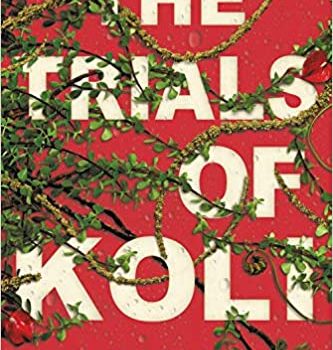Katharine Coldiron Reviews The Trials of Koli by M.R. Carey
 The Trials of Koli, M.R. Carey (Orbit 978-0-31645-868-9, $16.99, 496pp, tp) September 2020.
The Trials of Koli, M.R. Carey (Orbit 978-0-31645-868-9, $16.99, 496pp, tp) September 2020.
In short: if you loved M.R. Carey’s The Book of Koli, you will love The Trials of Koli just as much, if not more. Carey has delivered satisfactorily on the promise of the Rampart Trilogy with a second volume just as absorbing, stunning, and emotionally rich as the first. If you want more information about how the second book develops, though, read on.
Carey doesn’t recap the first novel too laboriously, but it’s still pretty easy to dive in without prior knowledge, as he summarizes the important parts of the first book in relevant spots. We pick up right where we left off, with our band of travelers making their labored way down the post-apocalyptic Midlands toward London. The travelers: Koli, an outcast from a small town; Ursala, a healer, scientist, and general wise woman; Cup, a teenaged former cult member and trans girl; and Monono, an iPod with extensive AI. They visit Birmingham, or Birmagen, in the realistically bastardized dialect most of the book’s characters speak, where the disaster of the Unfinished War is more visible than it has yet been; encounter a tribe of warriors from Half-Ax (Halifax) bent on conquering all the communities they can find; and wind up in a village near the sea, Many Fishes.
The group spends the bulk of the book at Many Fishes, integrating into the interesting community there and gradually making seaworthy an old boat stuck in the woods. All this time, Koli has been pursuing a wireless signal supposedly coming from London, but once they reach Many Fishes, they discover that London is underwater. (In the real world of 2020, it does sit in a basin.) Ursala and Koli still want to find the signal, so they must go the rest of the way on a boat. This part of the journey will plainly take place in The Fall of Koli, coming in March.
Unlike in Book, Koli does not narrate all of Trials. The other narrator is Spinner Vennastin, the object of Koli’s affection back in his hometown of Mythen Rood. Spinner’s version of the events in Book is not quite the same as Koli’s, in part because she has her own perspective on their short affair and in part because the leaders of Mythen Rood have not told the town the whole truth about how Koli left. Further, she is a different personality than Koli: smarter, more practical, much more shrewd. The differences in their narrative voices are subtle, intriguing, and under an admirable degree of authorial control. Spinner lends necessary new perspective; the reader does not grow tired of Koli, but he’s a dreamer, and Spinner has the hardy soul of a logistics officer.
The story Spinner tells from Mythen Rood is of a community starting to fall apart: “So many things were wrong in our lives, and the wrongness had made its way into places where you would not have thought to find it. It had sunk into our thoughts even, and turned them the wrong side out.” Koli’s departure started an avalanche of mistrust and resource loss, but other occurrences complicate the fate of Mythen Rood. Half-Ax warriors attempt to annex the town, a particularly harmful plant has a particularly fertile spring, and a deadly plague spreads through the population. (Reading this last during a global pandemic was a bit unsettling, particularly one of the town’s measures to keep the plague under control: “keep six paces apart.”) Spinner does her best to lead and help in this time of crisis – always providing for herself first – but it becomes clear across the book that nothing in Mythen Rood will ever be the same again.
Meanwhile, interpersonal conflicts erupt back in Many Fishes, particularly with Ursala. She clashes with both Cup and the tribal leadership of the village over spirituality, and she clashes brutally with Monono over control of her medical equipment and Cup’s needs in transitioning during puberty. Carey has created an unusual wise-woman figure in Ursala: patient and affectionate toward Koli, exasperated by religious belief, untrusting but forced to cooperate, endeavoring to save the human race with a permanent scowl.
At play in The Trials of Koli is a little of that middle-book problem in a trilogy, the Two Towers phenomenon, where you can’t really remember what of significance happened in the middle installment compared to the more explosive bookends. But, like The Two Towers, the richness of Trials comes in character development. Cup begins to open up and act her (young) age while they’re in the relative safety of Many Fishes, instead of the half-violent, half-catatonic cult member she once was. Koli finds himself a bit rudderless once he discovers London is underwater, but he finds purpose again in fixing up the boat. And when we return to Mythen Rood with Spinner – theoretically the more static of the two stories – the book mesmerizes, merely due to the conflicts created in this small, wracked community.
Plus, Carey’s unusual gift for proverb grants the book gravity and significance at every turn. “The truth isn’t always enough by its own self. Sometimes you have got to make a story out of it to make people understand it and take it into their hearts.” “What I think now is that all the tools we pick up and use come in the end to use us too.” “There is a game old people play that is really no game at all. They look at how the world is now, and remember how it was, and those two things come more and more to seem like a hell and a heaven. All good things are gone; all present things are poor, and thin, and not to be relied upon.”
The way these books imagine post-apocalyptic Britain is both inventive and bone-chillingly likely. Carey does not play at apocalypse for its higher stakes, or treat it as an empty dollhouse he can fill up as he chooses. He finds the thinnest nerve of the current world and presses, hard, forcing us to behold our way of life as impermanent and even endangered. As Spinner asks: “To sit in the middle of things, and bid all the world come dance to a tune you played. What must it have been like, to live like that? And to lose it?”
Katharine Coldiron is the author of Ceremonials (Kernpunkt Press), an SPD fiction bestseller. Her work as a book critic has appeared in The Washington Post, The Believer, The Guardian, and many other places. She lives in California and at kcoldiron.com.
This review and more like it in the September 2020 issue of Locus.
 While you are here, please take a moment to support Locus with a one-time or recurring donation. We rely on reader donations to keep the magazine and site going, and would like to keep the site paywall free, but WE NEED YOUR FINANCIAL SUPPORT to continue quality coverage of the science fiction and fantasy field.
While you are here, please take a moment to support Locus with a one-time or recurring donation. We rely on reader donations to keep the magazine and site going, and would like to keep the site paywall free, but WE NEED YOUR FINANCIAL SUPPORT to continue quality coverage of the science fiction and fantasy field.
©Locus Magazine. Copyrighted material may not be republished without permission of LSFF.








